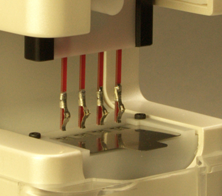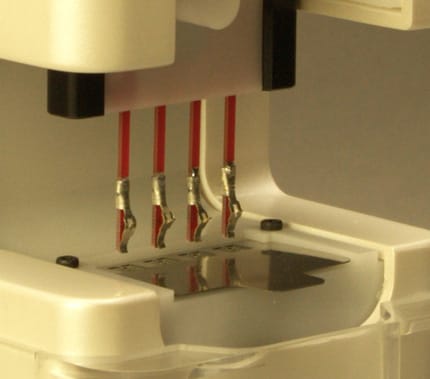NanoFacture DRS Makes Extracting DNA within Minutes Possible

The life sciences market has various DNA sequencing devices featuring different technologies and available at different price ranges. But all these devices need to be fed purified DNA samples for sequencing, and DNA separation and purification is one of the cumbersome, time consuming processes. The conventional protocols for DNA separation and purification also involve toxic chemicals.
DNA separation is an important step in a majority of biological and medical studies and even in disease diagnosis and prevention leading to a huge demand for DNA preparation kits and reagents. Each lab spends anywhere between $5000 to $10000 per year on these sample preparation kits and reagents contributing to the $3 billion global market for sample preparation devices, consumables and disposables.
NanoFacture, along with engineers from University of Washington have created a device for simpler, more efficient and environmental friendly way of extracting DNA from human fluid samples. This novel device, NanoFacture DRS (DNA Recovery System) is a small box-shaped kit powered by the company’s proprietary technology that uses a combination of electric field, chemical affinity and capillary action to achieve the results.
NanoFacture DRS employs disposable cartridges housing tiny probes called microtips and nanotips that are dipped into saliva, sputum, blood or other human fluid sample and an electric field is applied within the liquid. The particles in the sample tend to concentrate around the surface of the probe, with the larger particles hitting the tip and swerving away while smaller DNA sized molecules stick to the probe and are trapped on the surface. NanoFacture can separate and purify DNA in two or three minutes as against minimum thirty minutes required for separation using conventional processes. It also produces yields comparable to that of popular commercial kits, but at much lower costs and smaller footprint than traditional techniques that require centrifuging and washing. In addition to it, the sample on tips can be quickly dried for long term storage and archiving as well. The current device uses cartridges with 4 probes and is capable of working on four different samples at once, but the technology can be scaled up for large scale handling of 96 samples at a time.
NanoFacture in collaboration with KNR Systems, a South Korean firm will be manufacturing the NanoFacture DRS devices and they are expected to hit the market soon.

